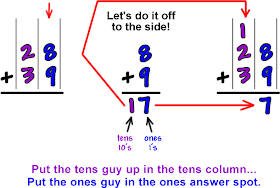So, who'd have thought that I'd have fun spending 4 days (25 hours) discussing...
 The Commutative, Associative and Distributive Properties
The Commutative, Associative and Distributive PropertiesAlgorithms
Compensation Strategy
Mental Math
Identity Property
Order of Operations (PEMDAS)
Constant Difference
Decimal Points and Percentages
The way we teach math nowadays is a far cry from the "Yours is not to reason why, just invert and multiply" mentality of my childhood. It is unsurprising that I am lacking mathematical confidence after an education wherein traditional algorithms replaced an understanding of how numbers work.
I learned to "carry the one" but wasn't taught that the "one" was actually a "ten".
Today the traditional algorithms for addition, subtraction, multiplication and division are taught after the children have developed an understanding of our number system. In kindergarten we explore basic numbers and each successive grade builds on that understanding.
It's truly incredible to listen to children explain how they mentally solved a math problem by manipulating the numbers into "friendly" or "landmark" numbers and giving the parts meaning. For example (taken from the book pictured above), 38 + 25 could be solved as 30 + 20 = 50 then 8 + 5 = 13 then adding these two numbers together to get your answer 50 + 8 = 63. Or another child might try it this way, 38 + 2 = 40 then 40 + 20 = 60 so 60 + 3 = 63. There are so many possible ways to figure this out and the tradition algorithm is simply one of many.
Interestingly, once children develop number sense, the traditional way I learned of "borrowing" and "carrying" becomes the most confusing, complicated one of them all!
Kudos to our workshop leaders, Kerry and Christina, for making me as smart as fifth grader!
Helpful Resource:
Check out the Common Core Alignment Guidance for Everyday Mathematics. Lessons in Everyday Math are color coded according to relevance to the Common Core.


I would like to be enthusiastic about this, but I hate math.
ReplyDeleteHow can you dislike math but love algebra?! I loved geometry, but that's not really math -- it's space.
Steve - I had a really fantastic algebra teacher who was also easy on the eyes so I guess that was the winning combination. I did so well the next year I moved into honors geometry and then promptly to down to basic geometry where I squeaked by. I never really got all those equations, too much memorization and no understanding.
ReplyDeleteI LOVE LOVE LOVE math. I am trying to teach rather elementary math to moms at the homeless shelter who want to pass the GED. I would like to move them away from a cookbook approach to problem-solving to a place where they will have a feel for the numbers, something they have never experienced.
ReplyDeleteYour workshop sounds like a lot of fun. You will definitely enjoy sharing your new math skills with your class.
I LOVE THIS SERIES OF BOOKS! I took a workshop similar to what you are taking 9 years ago and it still drives my teaching. The Base System of Tens not only changed how I thought about math but how I teach it to my kids. When I went through all the common core training this past year I just kept thinking about this book and the workshop I took with it!:)
ReplyDeleteBarbara - It is so interesting that you love math because I thought of the connection to music. Do you think math helps you as a musician and deepens your understanding of it?
ReplyDeleteI really enjoy teaching math to the kindergarten and first grade children but I am not sure I would enjoy teaching adults. I would love to hear more about your experiences with the moms.
Mrs. Ziegler - Isn't it wonderful to see that math can be such an engaging subject? Perspective is everything and it's nice to know changes are being made all over. What math curriculum do you use at your school? Thanks for dropping by FYB. It is great to connect with other K teachers.
Gary,
ReplyDeleteThanks so much for sharing. I wished I had gone to this workshop. Hopefully I will be able to pick it up. Yeah I know... carrying 1 over isnt really 1. I guess that makes it very confusing. Thanks again.
i was intimidated by math (and thus 'hated it') until i got to college and started learning statistics, then somehow found that numbers could be fun and my math phobia lessened!
ReplyDeletehappy to report that so far, at age 7, tasha loves math and seems to possess great number sense! let's hope she can withstand the usual anti-math socialization that seems to happen to girls as they develop....
Kimy - Your comment is timely because just today Teaching Tolerance has a post about girls and math. You can find it using this link
ReplyDeletehttp://www.tolerance.org/blog/restoring-math-confidence-girls
Cindy (is that you?) - Have you taken care of any of the professional development opportunities this summer? I would have attended more but some of the dates fell when I was away.